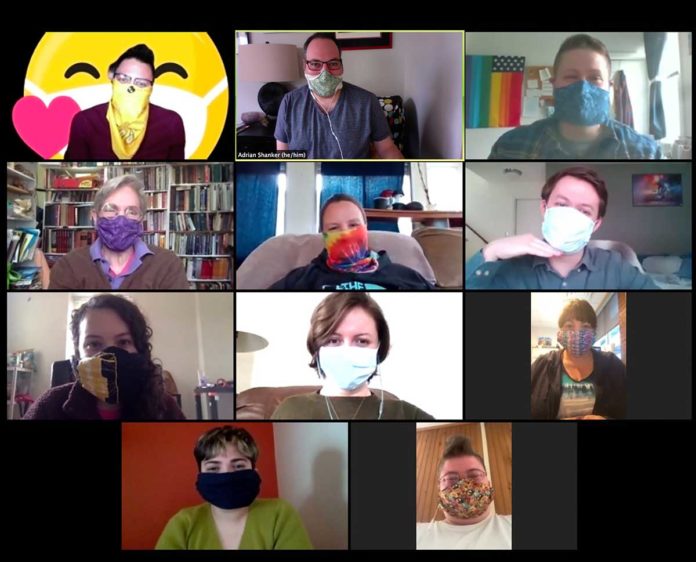“Frankly, we’re seeing lots of community concern around sexual health,” said Adrian Shanker, founder and executive director of Bradbury-Sullivan LGBT Community Center, “We’re also seeing people out looking for sexual encounters.” This week, Erie County published “Sex and Coronavirus Disease 2019 (COVID-19),” public health guidance on safe sex practices in the midst of this pandemic. Allentown will follow in publishing sexual health guidance, and Shanker is hopeful that LGBTQ and non-LGBTQ Pennsylvanians will start to see similar guidances published in other counties.
Allentown Health Bureau Director Vicky Kistler said, “It is important for citizens to realize that social distancing is our best line of defense against COVID-19 infection. It is unrealistic to think that people have suspended all sexual activity and that is why using a common-sense approach to safer sex is important. Multiple partners can multiply risk for both sexually transmitted infections (STIs) and COVID-19.”
According to Shanker, the Erie County health department modeled its sexual health guidance on one issued by the New York City Department of Health. “Bradbury-Sullivan LGBT Community Center encouraged both [Allentown and Erie County] health bureaus to adopt guidance on this topic,” said Shanker. Michael Mahler, the publisher of Erie Gay News and local activist, said the working relationship between the LGBTQ community and Erie County’s health department has enjoyed a long history of mutual support. “As a matter of fact,” said Mahler, “one of [the health department’s] new hires is the person who coordinates our annual Bear Run. There’s an HIV task force that has met for years [as well].”
Shanker said that the impact and importance of this sexual health guidance are not about risk avoidance. “It’s about risk awareness,” said Shanker, “We want to make sure people in our community and beyond the LGBT community can make decisions that are based on risk awareness and understanding. For example, in normal times, kissing might not seem very risky but during a pandemic, it might be one of the riskiest things one can do.” In fact, the guidance explains that kissing is one of the quickest ways to pass COVID-19 as the virus is spread predominately through saliva. “Avoid kissing anyone who is not part of your small circle of close contacts,” reads the guidance.
The guidance also recommends that the safest sex partners are either yourself or a partner you live with. This can have very positive connotations, said Shanker: “Encouraging people to learn to love themself and to love their bodies [is important].” This guidance also uses inclusive language to acknowledge and educate on sexual practices that may be outside the heteronormative model. “There’s an understanding that within the LGBT community,” said Shanker, “some sex practices are fairly pervasive and ubiquitous and might come with some additional risk during COVID-19.”
Sex workers are included in the guidance as well. As per the document, those who make a living by having sex are encouraged to take a break from interpersonal interactions and explore options for video dates, sexting or chat rooms. “I want to be very clear,” said Shanker, “it’s not about judging people for the risk that they take on, it’s about educating people so they can make the best decision for themselves and their partners.”
Shanker tasks LGBTQ organizations throughout Pennsylvania with the dissemination of this guidance or one like it. “It comes down to local LGBT community organizations using this as an opportunity to say, ‘Hey, this is what our local health bureau is suggesting.’” Because the Bradbury-Sullivan Center is a trusted messenger for the LGBTQ community in Allentown, explained Shanker, LGBTQ community centers like it are that much more responsible for relaying public health information.
There are myriad creative ways in which LGBTQ community centers can spread the word, said Shanker. “We’ve actually hired drag queens to record videos that summarize public health messages,” said Shanker, “We’ve run three of them already and each of them has been watched by more than 20,000 people in the Lehigh Valley area. One of them teaches how to wash hands correctly. Another one actually addresses sexual health and teaches that the safest sex partner is yourself. A third one talks about wearing a mask when you’re getting curbside pickup. They’re funny videos, but they’re also trying to promote health messages.”
Allentown will release similar guidance to that released by Erie County, officials are just waiting on a Spanish translation. “Allentown has a large Latinx population,” explained Shanker, “so it’s very important that public health information is available in Spanish as well. It’s important for any kind of public health guidance to address the language access barriers.”
Shanker encourages other municipalities and counties to adopt sexual health guidance for the good of the LGBT community and for the general population. “They should follow Allentown and Erie in making sure these guidances are sex-positive and are focused on risk awareness and harm reduction and not judgment,” finished Shanker, “Because that is how we will work together to prevent the spread of this dangerous virus and also keep the community safe.”
Ask questions, get answers about COVID-19
